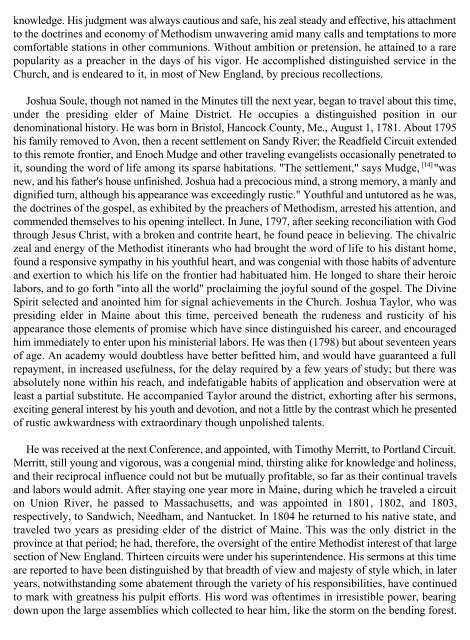History of the M.E. Church, Vol. IV - Media Sabda Org
History of the M.E. Church, Vol. IV - Media Sabda Org
History of the M.E. Church, Vol. IV - Media Sabda Org
Create successful ePaper yourself
Turn your PDF publications into a flip-book with our unique Google optimized e-Paper software.
knowledge. His judgment was always cautious and safe, his zeal steady and effective, his attachment<br />
to <strong>the</strong> doctrines and economy <strong>of</strong> Methodism unwavering amid many calls and temptations to more<br />
comfortable stations in o<strong>the</strong>r communions. Without ambition or pretension, he attained to a rare<br />
popularity as a preacher in <strong>the</strong> days <strong>of</strong> his vigor. He accomplished distinguished service in <strong>the</strong><br />
<strong>Church</strong>, and is endeared to it, in most <strong>of</strong> New England, by precious recollections.<br />
Joshua Soule, though not named in <strong>the</strong> Minutes till <strong>the</strong> next year, began to travel about this time,<br />
under <strong>the</strong> presiding elder <strong>of</strong> Maine District. He occupies a distinguished position in our<br />
denominational history. He was born in Bristol, Hancock County, Me., August 1, 1781. About 1795<br />
his family removed to Avon, <strong>the</strong>n a recent settlement on Sandy River; <strong>the</strong> Readfield Circuit extended<br />
to this remote frontier, and Enoch Mudge and o<strong>the</strong>r traveling evangelists occasionally penetrated to<br />
[14]<br />
it, sounding <strong>the</strong> word <strong>of</strong> life among its sparse habitations. "The settlement," says Mudge, "was<br />
new, and his fa<strong>the</strong>r's house unfinished. Joshua had a precocious mind, a strong memory, a manly and<br />
dignified turn, although his appearance was exceedingly rustic." Youthful and untutored as he was,<br />
<strong>the</strong> doctrines <strong>of</strong> <strong>the</strong> gospel, as exhibited by <strong>the</strong> preachers <strong>of</strong> Methodism, arrested his attention, and<br />
commended <strong>the</strong>mselves to his opening intellect. In June, 1797, after seeking reconciliation with God<br />
through Jesus Christ, with a broken and contrite heart, he found peace in believing. The chivalric<br />
zeal and energy <strong>of</strong> <strong>the</strong> Methodist itinerants who had brought <strong>the</strong> word <strong>of</strong> life to his distant home,<br />
found a responsive sympathy in his youthful heart, and was congenial with those habits <strong>of</strong> adventure<br />
and exertion to which his life on <strong>the</strong> frontier had habituated him. He longed to share <strong>the</strong>ir heroic<br />
labors, and to go forth "into all <strong>the</strong> world" proclaiming <strong>the</strong> joyful sound <strong>of</strong> <strong>the</strong> gospel. The Divine<br />
Spirit selected and anointed him for signal achievements in <strong>the</strong> <strong>Church</strong>. Joshua Taylor, who was<br />
presiding elder in Maine about this time, perceived beneath <strong>the</strong> rudeness and rusticity <strong>of</strong> his<br />
appearance those elements <strong>of</strong> promise which have since distinguished his career, and encouraged<br />
him immediately to enter upon his ministerial labors. He was <strong>the</strong>n (1798) but about seventeen years<br />
<strong>of</strong> age. An academy would doubtless have better befitted him, and would have guaranteed a full<br />
repayment, in increased usefulness, for <strong>the</strong> delay required by a few years <strong>of</strong> study; but <strong>the</strong>re was<br />
absolutely none within his reach, and indefatigable habits <strong>of</strong> application and observation were at<br />
least a partial substitute. He accompanied Taylor around <strong>the</strong> district, exhorting after his sermons,<br />
exciting general interest by his youth and devotion, and not a little by <strong>the</strong> contrast which he presented<br />
<strong>of</strong> rustic awkwardness with extraordinary though unpolished talents.<br />
He was received at <strong>the</strong> next Conference, and appointed, with Timothy Merritt, to Portland Circuit.<br />
Merritt, still young and vigorous, was a congenial mind, thirsting alike for knowledge and holiness,<br />
and <strong>the</strong>ir reciprocal influence could not but be mutually pr<strong>of</strong>itable, so far as <strong>the</strong>ir continual travels<br />
and labors would admit. After staying one year more in Maine, during which he traveled a circuit<br />
on Union River, he passed to Massachusetts, and was appointed in 1801, 1802, and 1803,<br />
respectively, to Sandwich, Needham, and Nantucket. In 1804 he returned to his native state, and<br />
traveled two years as presiding elder <strong>of</strong> <strong>the</strong> district <strong>of</strong> Maine. This was <strong>the</strong> only district in <strong>the</strong><br />
province at that period; he had, <strong>the</strong>refore, <strong>the</strong> oversight <strong>of</strong> <strong>the</strong> entire Methodist interest <strong>of</strong> that large<br />
section <strong>of</strong> New England. Thirteen circuits were under his superintendence. His sermons at this time<br />
are reported to have been distinguished by that breadth <strong>of</strong> view and majesty <strong>of</strong> style which, in later<br />
years, notwithstanding some abatement through <strong>the</strong> variety <strong>of</strong> his responsibilities, have continued<br />
to mark with greatness his pulpit efforts. His word was <strong>of</strong>tentimes in irresistible power, bearing<br />
down upon <strong>the</strong> large assemblies which collected to hear him, like <strong>the</strong> storm on <strong>the</strong> bending forest.
















